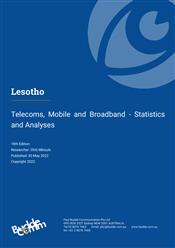Lesotho Telecoms Market Report
Telecoms, Mobile and Broadband - Statistics and Analyses

Telecom regulator launches SIM registration drive
Until late 2020, Lesotho’s telecom regulator maintained a market duopoly between the privatised national operator, Econet Telecom Lesotho (ETL), which is focussed on fixed-line services, and Vodacom Lesotho, which dominates the mobile sector. Competition between the two was insufficient to promote effective price reductions for consumers, while the regulator had no mechanisms in place to monitor the telcos to ensure quality of service and fair pricing for consumers. The small size of the country’s population provided little incentive for new players to enter the market.
Legal wrangling between the regulator and the telcos are ongoing. Both telcos were fined in late 2020, though Vodacom has the more troubled relationship with the regulator. This culminated in the regulator having attempted to revoke Vodacom Lesotho’s operating licence, a process which was temporarily suspended by the Supreme Court after the company appealed. A positive outcome for consumers was the deployment in early 2021 of a service to monitor traffic and billing. This ended the practice whereby the regulator was dependent on telcos submitting data about their performance, billing, and other matters.
The regulator has also turned its attention to addressing multiple SIM ownership and stem incidences of crimes committed using unregistered SIMs. In May 2022, it instructed the country’s MNOs to begin registering SIM cards on their networks from the following month.
Vodacom was the first operator to introduce mobile broadband services in the country, supplemented with a WiMAX network. In late 2014 the company launched commercial services based on LTE technology. This was followed by fixed-wireless 5G trials in early 2019 based on a trial 3.5GHz licence. Vodacom Lesotho was among the first network operators in the region to conduct such trials.
The market is shrugging off the impact of the pandemic which weighed on spending on telecoms services and devices. Consumers remain slightly under pressure amid ongoing macroeconomic challenges facing the country. However, the crucial nature of telecom services, both for general communication as well as a tool for home-working, will offset such pressures over the long term. In many markets the net effect should be a steady though reduced increased in subscriber growth.
The report also covers the responses of the telecom operators as well as government agencies and regulators as they react to the crisis to ensure that citizens can continue to make optimum use of telecom services. This can be reflected in subsidy schemes and the promotion of tele-health and tele-education, among other solutions.
Key developments:
- Vodacom Lesotho transfers its M-Pesa division to a new independent company, VCL Financial Services;
- Vodacom reports an increase in m-money subscriptions at end-2021;
- Telecom regulator assumes the right to approve telcos’ senior management appointees, publishes SIM registration regulations, instructs MNOs to begin registering their customers’ SIM cards;
- Econet Telecom Lesotho expands FttP network;
- Lesotho’s National Assembly approves the Computer Crimes and Cyber Security Bill, 2022;
- Safaricom and Vodacom Group acquire the M-Pesa brand;
- Improved internet connectivity following landing of international cables;
- Universal Service Agency expanding base tower infrastructure in remote areas;
- Report update includes ITU statistics, regulator’s ICT market report, updated Telecom Maturity Index charts and analyses, operator data to Q1 2022, recent market developments.
Companies mentioned in this report:
Telecom Lesotho, Econet Telecom Lesotho, Vodacom Lesotho, Eskom, Comnet
Related Reports
- Africa - Mobile Infrastructure and Mobile Broadband
- Africa - Mobile Network Operators and MVNOs
- Africa - Fixed Broadband Market - Statistics and Analyses
- Benin - Telecoms, Mobile and Broadband - Statistics and Analyses
- Burkina Faso - Telecoms, Mobile and Broadband - Statistics and Analyses
- South Africa - Telecoms, Mobile and Broadband - Statistics and Analyses
- Kenya - Telecoms, Mobile and Broadband - Statistics and Analyses
- Ghana - Telecoms, Mobile and Broadband - Statistics and Analyses
- Zambia - Telecoms, Mobile and Broadband - Statistics and Analyses
- Gabon - Telecoms, Mobile and Broadband - Statistics and Analyses
Share this Report
TMT Intelligence
A platform to scale your intelligence tasks
Monitor critical insights with our AI-powered Market Intelligence Platform gathering and analyzing intelligence in real time. With AI trained to spot emerging trends and detect new strategic opportunities, our clients use TMT Intelligence to accelerate their growth.
If you want to know more about it, please see:
Research Methodology
BuddeComm's strategic business reports contain a combination of both primary and secondary research statistics, analyses written by our senior analysts supported by a network of experts, industry contacts and researchers from around the world as well as our own scenario forecasts.
For more details, please see:
More than 4,000 customers from 140 countries utilise BuddeComm Research
Are you interested in BuddeComm's Custom Research Service?
Hot Topics
News & Views
Have the latest telecommunications industry news delivered to your inbox by subscribing to BuddeComm's weekly newsletter.